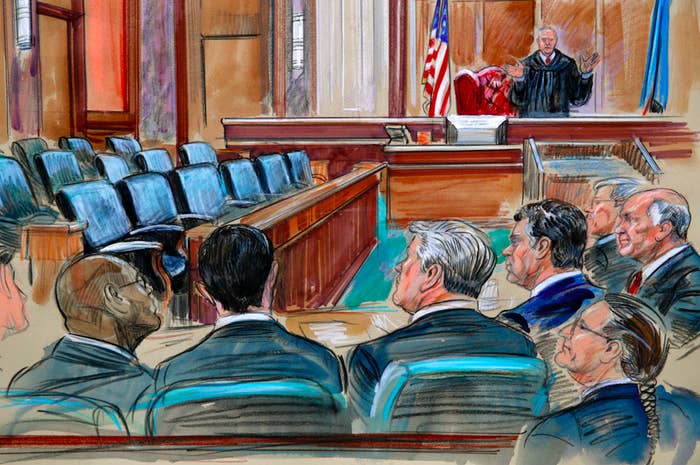
WASHINGTON — The judge who presided over Paul Manafort’s trial in Alexandria, Virginia, last summer won’t face disciplinary action for his treatment of prosecutors from special counsel Robert Mueller’s office, according to a court order obtained by BuzzFeed News.
US District Judge T.S. Ellis III faced four ethics complaints over his handling of Manafort’s trial, according to the March 29 order. The document doesn’t name Ellis, but a source familiar with the situation confirmed that the complaints were against the judge. The order, from Chief Judge Roger Gregory of the US Court of Appeals for the 4th Circuit, also refers to the “high-profile, politically-charged” nature of the trial.
Ellis was noticeably tough on prosecutors throughout Manafort’s trial, at times taking the unusual step of criticizing the government while the jury was in the courtroom. The complaints, which were based on media reports the complainants read or saw about the trial, alleged that Ellis violated judicial ethics rules by losing his temper, accusing prosecutors of misconduct, making inappropriate comments in front of the jury, and engaging in partisanship by being hostile toward the government.
Gregory wrote that although Ellis was “sometimes strident with counsel, to be sure, and especially with the prosecution,” his comments did not rise to the level of misconduct. The fact that Ellis at times pushed prosecutors to move more quickly in presenting their case didn’t mean the judge was signaling that the government was wrong or that the judge was trying to hurt the prosecution, Gregory wrote.
“One might say that the judge may have been injudicious in his tone or choice of words, but one cannot say that his comments were so discourteous, uncivil, or ‘bullying’ as to ‘transcend ... the expected rough-and-tumble of litigation,’” Gregory wrote, quoting language from a report about applying the judiciary’s ethics rules.
Gregory also wrote that Ellis “did not cross the line into partisan political commentary.”
“To be sure, especially in a high-profile, politically-charged trial, a judge should take care — with the precepts of Canon 5 in the Code of Conduct for United States Judges in mind — to avoid careless remarks that could foreseeably be interpreted as partisan,” Gregory wrote.
Ellis’s chambers declined a request for comment Monday.
The individuals who brought the complaints against Ellis can appeal Gregory’s decision to the 4th Circuit Judicial Council. The complainants are not identified in the court.
A federal jury in Virginia found Manafort guilty of eight counts of tax and bank fraud charges in August. Manafort was also charged by Mueller’s office in federal court in Washington, DC, and he took a plea deal in that case shortly before his second trial was set to begin in September.
Ellis last month sentenced Manafort to 47 months in prison, with credit for the roughly nine months he’d already spent in jail while his cases were pending. The judge in Manafort’s DC case, US District Judge Amy Berman Jackson, sentenced Manafort to 73 months in prison, but a substantial portion of that — 30 months — will run at the same as his Virginia sentence. In total, Manafort is set to spend just under seven years in prison for the two cases brought by Mueller’s office.
As Manafort prepares to serve time in a federal prison, he’s facing a new set of charges in state court in New York — the Manhattan District Attorney’s Office announced that Manafort had been indicted for fraud March 13, the same day as his final sentencing in the Mueller cases.
CORRECTION
A single judge issued the order regarding complaints against Judge T.S. Ellis III. A previous version of this story incorrectly stated the number of judges involved.

